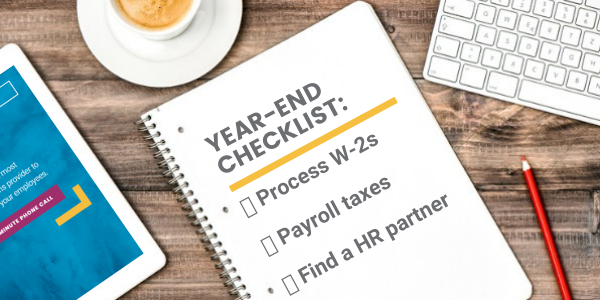A Complete Checklist for Your Year-End Tasks
As the holidays quickly roll in, it is time to consider all the tasks on your payroll and HR to-do list. This the season for surfing santas and sandmen, but also year-end paperwork too. Things like processing annual and holiday bonuses, rounding out 401(k) contributions, and informing employees about their FSA funds.
But end-of-year tax filing is probably the biggest task of them all. It’s a reporting requirement that applies to all employers, regardless of your size. And if you’re not careful about filing taxes correctly (or on time), you can face unexpected fines.
We know year-end paperwork and reporting can feel overwhelming. To help simplify your world, we’ve create a checklist of tax filings and deadlines to help you close out 2018 and prepare for a successful (and less stressful) 2019.
Year-End Tax Reporting:
One of your key responsibilities as an employer is to provide reports to both your employees and independent contractors showing how much they made in the previous year so they can properly fill out their own taxes. These are your W-2 and 1099-MISC forms.
You’ll also need to send this information to the IRS and Social Security Administration (SSA) for verification purposes (Form W-3 and 1096), as well as submit your unemployment taxes (Form 940), and your quarterly payroll tax report (Form 941).
All of this reporting is due by January 31, 2019—so the key is to start sooner rather than later. Here’s what you need to know:
Note: Forms that we can help you file are marked with an *
By December 2018:
🗹 Did your employees move this year? Ask them to verify their current mailing address, but also check that you have their correct legal name and social security number on file.
🗹 Let employees know when they can expect to receive their W-2 forms and other tax related paperwork.
🗹 Gather and collect all the information you need in one place to begin filling out your end-of-year paperwork.
By January 31, 2019:
🗹 Provide W-2 Forms to Employees* | This is the form you send employees each year with information on their gross pay, Social Security and Medicare pay, federal and state income tax withholding, and tax-related deductions. Failure to submit these forms prior to the deadline can result in fines starting at $50/return, which can quickly add up.
🗹 Provide Form 1099-MISC to Independent Contractors | This form is for employers to report how much they’ve paid contractors in the past calendar year so contractors can report their income.
🗹 Submit Form W-3 (and copies of all W-2s) to Social Security Administration* Form W-3, officially known as “Transmittal of Wage and Tax Statements”, shows the total earnings, Social Security wages, Medicare wages, and withholding for all your employees in the previous year. Submit this transmittal form to the Social Security Administration, along with all W-2 forms.
🗹 Submit Form 1096 (and copies of all 1099s) to IRS | Form 1096 is a transmittal form for 1099s that gets submitted to the Internal Revenue Service, along with all 1099 forms.
🗹 File Forms 940 to IRS (FUTA)* | This form is used to report and pay your annual Federal Unemployment Tax Act (FUTA) tax to the IRS. Together with state unemployment tax systems, the FUTA tax provides funds for paying unemployment compensation to workers who have lost their jobs
🗹 Form 941 or 943 (Quarterly Tax Form)* | Form 941 is used to report income taxes, Social Security tax, or Medicare tax withheld from employees paychecks and pay the employer's portion of these items. If you paid wages to one or more farm workers, use Form 943 instead. Both of these forms are required to be filed on a quarterly basis.
Affordable Care Act Reporting:
If you employ more than 50 full-time employees, the Affordable Care Act (ACA) requires you to offer your employees health insurance. And each year, if you’re one of those large employers, you must send Form 1094-C and 1095-C, also known as “Employer-Provided Health Insurance Offer and Coverage Insurance” to your employees and to the government.
By January 31, 2019:
🗹 Provide Form 1095-C to Employees* | The 1095-C provides information about health insurance and is sent to both employees and the IRS. It details the coverage offered to the employee, the lowest-cost premium available to the employee, and the months of the year when the coverage was available.
By February 28, 2019 (by mail):
🗹 Submit Form 1094-C and 1095-C to IRS* | For 1094-C is simply a summary or cover sheet for 1095-C and must accompany Form 1095-C when it’s submitted to the IRS. All ACA forms come with severe late fines starting at $260/return. If you’re filing electronically, the deadline for Forms 1094-C and 1095-C is April 1, 2019.
Business Income Tax Reporting:
If you run your small business as a sole proprietorship, you’re allowed to report your business income and expenses on a Schedule C attachment to your personal income tax return. But if you’re a corporation then you must always prepare a separate corporate tax return on Form 1120, 1120-S or 1065 depending on your business. As you prepare your business income taxes, we encourage you to work with your CPA and legal counsel to determine the tax strategy that’s right for you.
By March 15, 2019:
🗹 Submit Form 1120-S to IRS | This is the income tax return form for a S Corporation specifically and is used to report income, gains, losses, deductions, and credits, etc. For this corporate tax form, it’s important to track deadlines, as they are unique to your tax year. And for each month the return is late, the IRS will impose a minimum penalty of $195/month, multiplied by the number of shareholders.
🗹 Submit Form 1065 to IRS | If your company is a Partnership—such as groups or joint ventures—this is the form you need to submit to report income, gains, losses, deductions, and credits. Generally, a Partnership must file Form 1065 by the 15th day of the third month following the date its tax year ended.
By April 15, 2019:
🗹 Submit Form 1120 to IRS | Like the others, this form also serves to figure the income tax liability for a corporation, but for a C Corporation specifically. Generally, a C Corporation must file its income tax return by the 15th day of the fourth month after the end of its tax year. A corporation that doesn’t file its tax return by the due date, may be penalized 5% of the unpaid tax for each month the return is late, up to a maximum of 25% of the unpaid tax.
W-2s? Payroll Tax Admin? We Can Help!
When you started your own business, we’re assuming you didn’t have paperwork in mind. When you choose to handle HR yourself, you can face a lot of pressure from your employees and the government to file the right paperwork at the right time. Not to mention, it’s a lot to navigate on your own. If you’re a HR manager, think of the strategic projects you could focus on to grow your employees (and the business) if this administrative work wasn’t on your plate.
At ProService Hawaii, HR is our business. We can help you manage your Hawaii Payroll Services, W-2 processing and your payroll tax related paperwork, and in many cases, file it for you. And when you partner with us, you get the efficiency and cost savings of a much better system.
Free up your time so you can put focus and passion back into your business.
Schedule a free HR consultation and learn how our HR services can power your business.
This material has been prepared for informational purposes only, and is not intended to provide, and should not be relied on for, legal or tax advice. Please consult with your professional legal or tax adviser if you have questions about this content.





